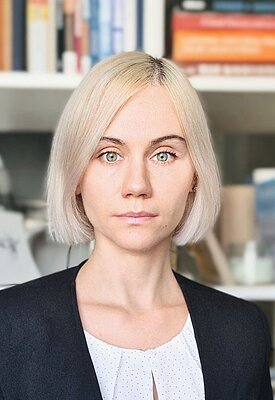Dr. Katarzyna Nowak
Researcher

Dr. Katarzyna Nowak
Researcher
| Office | RECET, Spitalgasse 2, Hof 1.1.4 |
|---|---|
| katarzyna.nowak(at)univie.ac.at | |
| Go to website | www.katarzyna-nowak.com |
Research interests:
- Cold War
- Cultural and social history
- Refugee studies
- Soviet and Eastern European history
- Intellectual history of communism and anti-communism
- The Vatican and the origins of the Cold War
Current Research Project:
"Knocking on the Vatican’s Gates. Refugees, the Holy See, and the Spectre of Communism, 1945-1958” (Marie Skłodowska-Curie Actions Postdoctoral Fellowship, 2023-2026)
This project is the first to explore the crucial – but hitherto neglected – role of the Vatican Relief Commission (the Pontificia Commissione di Assistenza, PCA) in assisting and resettling European refugees after World War II and in the early Cold War. It takes advantage of an unprecedented opportunity: the opening of the part of the Vatican Apostolic Archive (or VAA, named the Vatican Secret Archive until 2019) pertaining to the pontificate of Pius XII (1939-1958) in March 2020. To meet its central aim - providing a new understanding of Western humanitarianism in the postwar period - this project interrogates the documents held in VAA to integrate the missing puzzle piece of papal aid into the picture of the international refugee assistance. It demonstrates the importance of the Vatican’s faith-based humanitarianism and its use of refugees from Eastern Europe as a playing card in building an anti-communist defensive.
Selected Publications:
Monograph
Peer-Reviewed Articles and Book Chapters
Katarzyna Nowak, 'Recivilizing Refugees: Material Culture and Displacement in Transitions from War to Peace in Displaced Persons Camps in Post-Second World War Europe', S:I.M.O.N. – Shoah: Intervention. Methods. Documentation, 10 (2023) 1, 4–22. PDF
Peter Gatrell, Anindita Ghoshal, Katarzyna Nowak, and Alex Dowdall, ‘Reckoning with Refugeedom: Refugee Voices in Modern History’, Social History, 46:1, 70-95, 2021.
Lauren Banko, Katarzyna Nowak, and Peter Gatrell, ‘What is Refugee History, Now?’, Journal of Global History, 1–19, 2021.
Katarzyna Nowak, ‘“To Reach the Lands of Freedom”: Petitions of Polish Displaced Persons to American Poles, Moral Screening, and the Role of Diaspora in Refugee Resettlement’, Cultural and Social History, 16:5, 2019, 621-642.
Katarzyna Nowak, ‘“We Would Rather Drown Ourselves in Lake Victoria”: Refugee Women, Protest, and Polish Displacement in Colonial East Africa, 1948-49’, Immigrants & Minorities, 37:1-2, 2019, 92-117.
Katarzyna Nowak, ‘A Gloomy Carnival of Freedom. Sex, Gender, and Emotions among Polish Displaced Persons in the Aftermath of World War II’, Aspasia. The International Yearbook of Central, Eastern, and Southeastern European Women’s and Gender History, vol. 13, 2019, 113-134. 2020 BASEES Postgraduate Prize for the Best Article.
Katarzyna Nowak, „Z ludzi nie-ludzi jestem”. Przemiany tożsamościowe polskich dipisów w świetle dokumentów osobistych’, Z ojczyzny do obczyzny. Doświadczenia uchodźstwa polskiego, eds. Rafał Kleśta-Nawrocki, Marcin Lutomierski, Artur Trapszyc, Toruń: Polskie Towarzystwo Ludoznawcze, 2019. [in Polish]
Katarzyna Nowak, “Low in Health and Spirits.” Health and Hygiene Campaign in UNRRA Camps in Germany and Austria as a Form of Rehabilitation”, S. K. Knapton & K. Rossy (eds.), Relief and Rehabilitation for a Postwar World? Humanitarian Intervention and the UNRRA (Histories of Internationalism series with Bloomsbury Academic, forthcoming 2023).
Katarzyna Nowak, Archives and Historical Perspectives in Researching Humanitarianism, Handbook on Humanitarianism and Inequality, Silke Roth, Tobias Denskus, and Bandama Purkayastha (eds.), Edward Elgar (forthcoming 2023).
Reviews
‘Soviet Soft Power in Poland. Culture and the Making of Stalin’s New Empire, 1943-1957’, by Patryk Babiracki, European Review of History: Revue européenne d’histoire, 23:1-2, 2016, 276-278.
‘Rising Subjects. The 1905 Revolution and the Origins of Modern Polish Politics’, by Wiktor Marzec, Europe-Asia Studies, 73:3, 2021, 582-583.